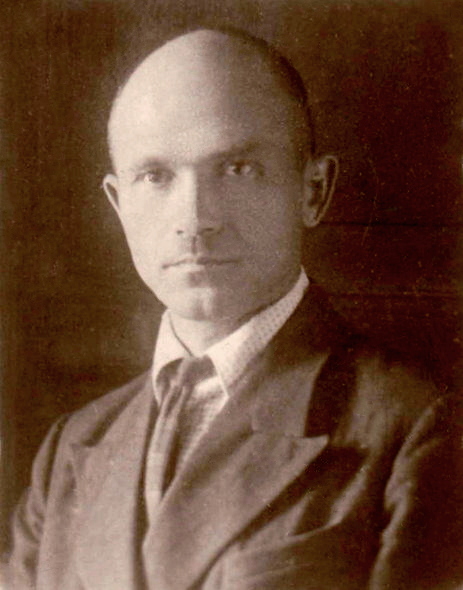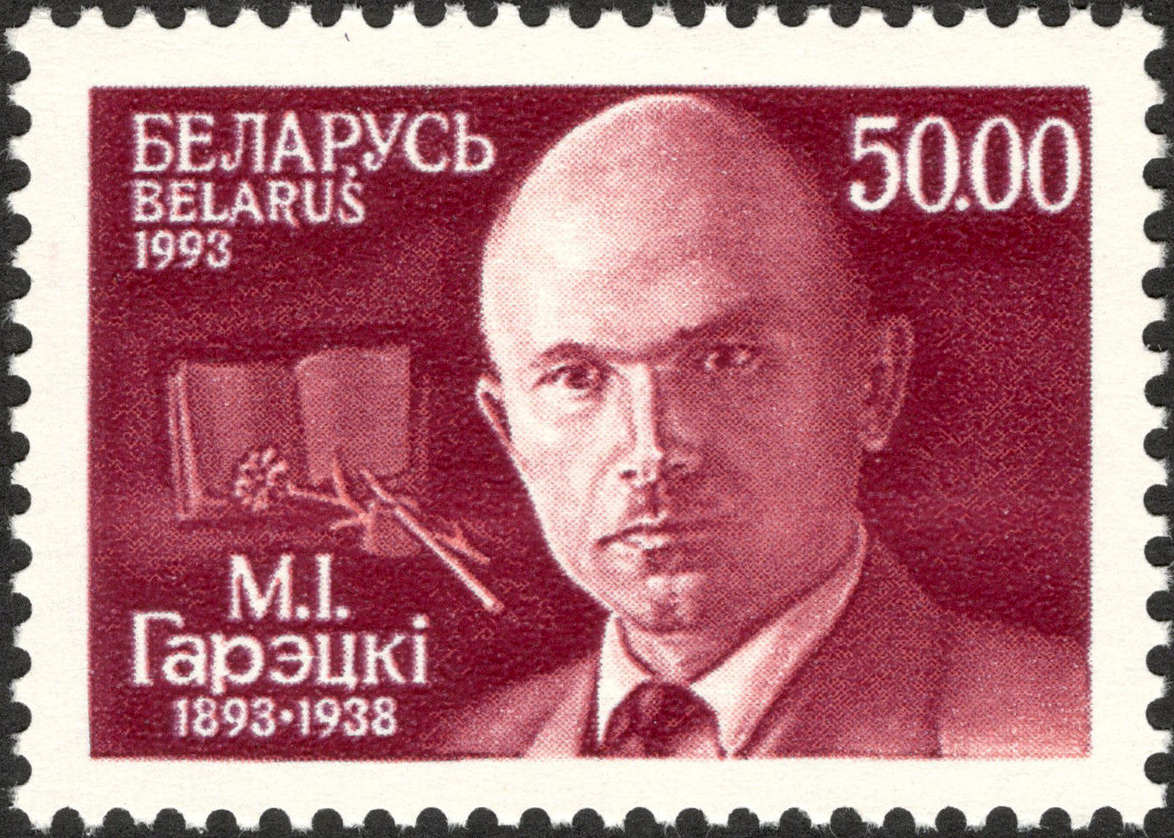Maksim Haretski on:
[Wikipedia]
[Google]
[Amazon]

 Maksim Haretski (18 February 1893 – 10 February 1938; be, Максі́м Іва́навіч Гарэ́цкі, russian: Макси́м Ива́нович Горе́цкий), also known as Maksim Harecki and Maksim Goretsky, was a
Maksim Haretski (18 February 1893 – 10 February 1938; be, Максі́м Іва́навіч Гарэ́цкі, russian: Макси́м Ива́нович Горе́цкий), also known as Maksim Harecki and Maksim Goretsky, was a
Maksim Harecki: biography in the Belarusian Electronic Encyclopedia
Some works by Maksim Harecki
{{DEFAULTSORT:Haretski, Maksim 1893 births 1938 deaths People from Mstsislaw District People from Mstislavsky Uyezd Belarusian writers Belarusian-language writers Soviet literary historians Soviet male writers 20th-century male writers Russian military personnel of World War I Belarusian people of World War I Recipients of the Order of St. George of the Fourth Degree Prisoners and detainees of Poland Belarusian prisoners and detainees Case of the Union of Liberation of Belarus Great Purge victims from Belarus Soviet rehabilitations

 Maksim Haretski (18 February 1893 – 10 February 1938; be, Максі́м Іва́навіч Гарэ́цкі, russian: Макси́м Ива́нович Горе́цкий), also known as Maksim Harecki and Maksim Goretsky, was a
Maksim Haretski (18 February 1893 – 10 February 1938; be, Максі́м Іва́навіч Гарэ́цкі, russian: Макси́м Ива́нович Горе́цкий), also known as Maksim Harecki and Maksim Goretsky, was a Belarus
Belarus,, , ; alternatively and formerly known as Byelorussia (from Russian ). officially the Republic of Belarus,; rus, Республика Беларусь, Respublika Belarus. is a landlocked country in Eastern Europe. It is bordered by ...
ian prose writer, journalist, activist of the Belarusian national renewal, folklorist, lexicographer, and professor. Maksim Harecki was also known by his pen-names ''Maksim Biełarus, M.B. Biełarus, M.H., A. Mścisłaŭski, Dzied Kuźma, Maciej Myška,'' and ''Mizeryjus Monus''. In his works he often appeared as ''Kuźma Batura, Liavon Zaduma.''
Maksim Harecki was born in village of Małaja Bahaćkaŭka in a peasant's family. He had two brothers – Haŭryła and Ivan.
In 1913 Harecki graduated from a college in Hory-Horki, and in 1916 from a military college in Petrograd. During the First World War
World War I (28 July 1914 11 November 1918), often abbreviated as WWI, was one of the deadliest global conflicts in history. Belligerents included much of Europe, the Russian Empire, the United States, and the Ottoman Empire, with fightin ...
he served in the Russian Army. He was wounded on October 25, 1914, and had to recover in the military hospitals of Vilnia, Moscow
Moscow ( , US chiefly ; rus, links=no, Москва, r=Moskva, p=mɐskˈva, a=Москва.ogg) is the capital and largest city of Russia. The city stands on the Moskva River in Central Russia, with a population estimated at 13.0 millio ...
and Mahilioŭ. After that, he continued to serve in the army until 1917 when he got very ill and was sent to Zheleznovodsk to recover and then left the army.
Later on, Harecki moved to Smolensk
Smolensk ( rus, Смоленск, p=smɐˈlʲensk, a=smolensk_ru.ogg) is a city and the administrative center of Smolensk Oblast, Russia, located on the Dnieper River, west-southwest of Moscow. First mentioned in 863, it is one of the oldest ...
and studied in the Archaeological University there. At that time he started to work for local newspapers. Soon he moved to Minsk
Minsk ( be, Мінск ; russian: Минск) is the capital and the largest city of Belarus, located on the Svislach and the now subterranean Niamiha rivers. As the capital, Minsk has a special administrative status in Belarus and is the admi ...
and in January 1919 to Vilnia, where he began working in the Belarusian Gymnasium of Vilnia and some newspapers.
In 1919 he married Leaniła Čarniaŭskaja in Vilnia. His wife worked as a teacher in the Belarusian Gymnasium of Vilnia. They had a son Leanid who died in the battle of Leningrad. Also, they had a daughter, Halina.
In January 1922 Harecki was arrested by Polish authorities as a political criminal and was put into the infamous Łukiszki prison in Vilnia. Following mass protests of the Belarusian minority, he was released and sent to Soviet-controlled East Belarus
East Belarus usually refers to the part of Belarus that was part of the Soviet Union between 1919 and 1939, as opposed to West Belarus that was part of the Second Polish Republic at that time.
The region was known as the Socialist Soviet Republi ...
. There he worked as a language and literature professor at some universities. He was a member of the Inbelkult.
In 1929, along with other Belarusian activists, Harecki became a target of a defamation campaign in the Soviet state media. He was arrested by the Soviets in July 1930 and accused of being a member of the Belarusian Liberation Union, a separatist organization. In April–May 1931 he was sentenced to five years of prison in Viatka. During this time Harecki wrote a lot of literature works. On November 4, 1937, he was arrested again and later on shot in the Great Purge
The Great Purge or the Great Terror (russian: Большой террор), also known as the Year of '37 (russian: 37-й год, translit=Tridtsat sedmoi god, label=none) and the Yezhovshchina ('period of Yezhov'), was Soviet General Secret ...
. He was rehabilitated in 1957.
Today Maksim Harecki is considered a classic of Belarusian literature. His books were translated into Ukrainian
Ukrainian may refer to:
* Something of, from, or related to Ukraine
* Something relating to Ukrainians, an East Slavic people from Eastern Europe
* Something relating to demographics of Ukraine in terms of demography and population of Ukraine
* So ...
, Russian
Russian(s) refers to anything related to Russia, including:
*Russians (, ''russkiye''), an ethnic group of the East Slavic peoples, primarily living in Russia and neighboring countries
*Rossiyane (), Russian language term for all citizens and peo ...
, Polish
Polish may refer to:
* Anything from or related to Poland, a country in Europe
* Polish language
* Poles
Poles,, ; singular masculine: ''Polak'', singular feminine: ''Polka'' or Polish people, are a West Slavic nation and ethnic group, w ...
, and German
German(s) may refer to:
* Germany (of or related to)
** Germania (historical use)
* Germans, citizens of Germany, people of German ancestry, or native speakers of the German language
** For citizens of Germany, see also German nationality law
**Ge ...
.
References
External links
Maksim Harecki: biography in the Belarusian Electronic Encyclopedia
Some works by Maksim Harecki
{{DEFAULTSORT:Haretski, Maksim 1893 births 1938 deaths People from Mstsislaw District People from Mstislavsky Uyezd Belarusian writers Belarusian-language writers Soviet literary historians Soviet male writers 20th-century male writers Russian military personnel of World War I Belarusian people of World War I Recipients of the Order of St. George of the Fourth Degree Prisoners and detainees of Poland Belarusian prisoners and detainees Case of the Union of Liberation of Belarus Great Purge victims from Belarus Soviet rehabilitations